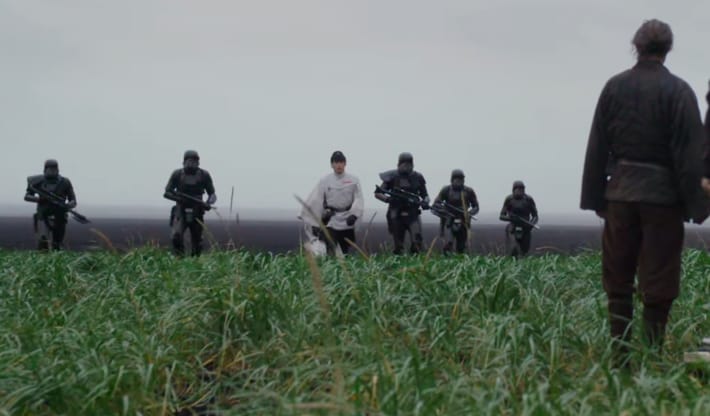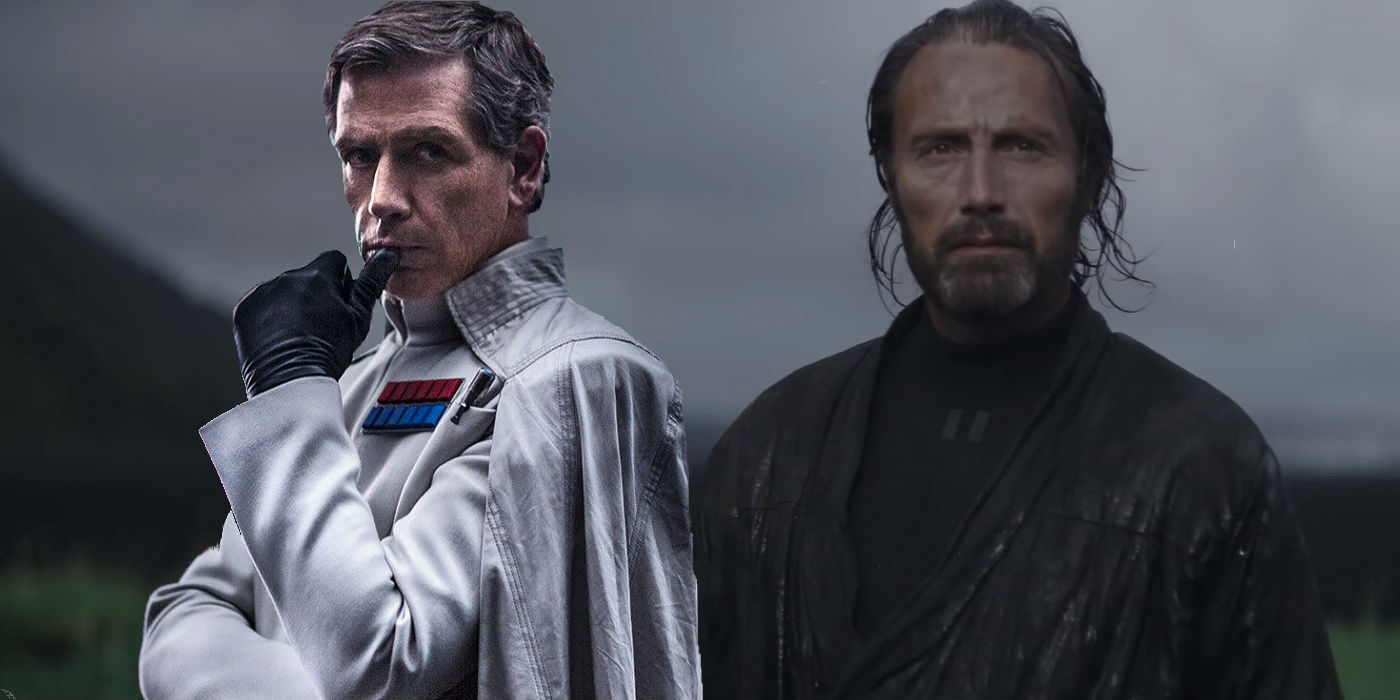
How Rogue One Taught Me Not To Be A Bad Guy
January 10, 2017 Jamey Alea 3 Comments
As both a Star Wars fan and a political advocate, I was very excited about the release of Rogue One in December. How could I not be? Look at this courageous band of rebels, a group comprised nearly entirely of oppressed minorities, fighting for what they think is right. The rebellion of Rogue One is made up of a small contingent of marginalized people, going against the odds to protect themselves from an Empire consisting of old white men in crisp uniforms. These were my people, fighting my fight, providing hope that we can prevail, even in times where the fight has been getting scarier than ever. I decided all this before the movie even came out – and I couldn’t wait. When it was finally time to see the film, just as I suspected, I saw myself on screen. Not in the colorful band of rebels, like I had been imagining, but in the white-clad Corps of Engineers for the Empire. Somewhere along the line, I started down the path of the Bad Guys™ and suddenly I had some soul-searching to do.
The realization that I identified more with the villains than the heroes happened as a slow burn over time, starting with the prequel novel Catalyst, which I read in advance of Rogue One’s release because I am an unapologetic nerd. Catalyst focuses mainly on the relationship between Director Orson Krennic and brilliant engineer Galen Erso leading up to their unfortunate meeting on Lah’mu at the beginning of Rogue One. It covers Krennic’s personal career path as he rises through the ranks of the Empire and his supervision of the design and production of the first Death Star. His long-term plans are to recruit Erso to the project, whose expertise on harnessing the energy from kyber crystals is essential to the design of the weapon, but whose pacifism prevents him from being willing to work with the military.

For reference: Director Orson Krennic (left, Bad Guy™, white cape) & engineer Galen Erso (right, Hannibal)
Krennic is extremely skilled at networking and the way that the book chronicled his pursuits in socializing quickly became unsettling to me. While I originally perceived what he was doing as manipulative social climbing, his thought processes were strikingly familiar to me from the way I socialize with my own colleagues. Like Krennic, I take pride in knowing everyone and being able to make important connections between intelligent people who I feel would benefit from knowing each other. How I spend and save my social capital is something I often consider and Krennic did this expertly. It got me thinking about my own network. Although I built it using similar methods as the bad guy (and yes, I already knew Krennic was the bad guy because he was wearing a white cape in the trailer and morality in Star Wars is pretty straightforward), of course I don’t think networking is inherently bad. But it did put the idea in my mind to make sure that I was using my network for good, not evil.
Issues of morality aside, it did cause me to relate more to Krennic than to Galen Erso, who I perceived as being weirdly resistant to good job opportunities. There’s a scene fairly early on in Catalyst where Galen meets up with his former mentor, Reeva Demesne, and she gently urges him to consider joining the shield defense project she is currently working on:
“The war has altered everything, not only for those directly involved in the conflict, but also for many of us here on Coruscant. Count Dooku shook us awake to a harsh reality, and most of us have traded theory for practicality. Even so, unlimited funding has been wonderful for research… In due time, we’ll return to [our dream of providing renewable energy on developing worlds] and we’ll be able to accomplish much more than we ever could before.”
I found myself thinking how difficult it would be to turn down an offer like this and Galen seemed foolish to me for resisting that career path. It didn’t hit me until a few chapters later – I know how this story ends. Galen Erso is the engineer for the Death Star project. I just got totally tricked into working on the Death Star project.
Back in the real world, I have been giving some thought lately to ethics in my work. I think it’s safe to say that it has at least crossed the minds of most of us in the tech industry since November’s election. I saw a short series of tweets by Kate Crawford shortly after the election that really affected me and made me start thinking about the reality of the moral conundrums we may be put in as engineers and developers over the next few years.
We need to talk about ethics more. Because developers will be asked to do some seriously awful things in the next 4 years. (1/5)
— Kate Crawford (@katecrawford) November 21, 2016
Will you build the Muslim registry? Or work on locating undocumented workers? Or deploy facial recognition to identify protesters? (3/5)
— Kate Crawford (@katecrawford) November 21, 2016
So talk about your bright lines – and write them down. It might just help you in the difficult years ahead. (5/5)
— Kate Crawford (@katecrawford) November 21, 2016
But even still, this felt like a distant fear that we were whispering about to each other, a possible eventuality in a world of many possible eventualities. It wasn’t something I was losing sleep over. I work for an ethical company, focused on sustainability and food justice, and besides, of course I wouldn’t write a database for muslims or immigrants. It would be easy for me to turn down work that I didn’t agree with, right?
And then a Star Wars novel literally tricked me into working on the Death Star project and I realized that I had to do better than that if I didn’t want to accidentally end up on the road to being a Bad Guy. I thought I was “safe” from doing evil because it would be obvious to me what evil looked like. I was forced to reevaluate my belief that I would never be coerced into using my career skills to do something immoral. This involved a realization about how essential it is to be self-critical about our work and to impose a level of accountability onto ourselves. Reeva thought she was working on defense tech, to protect her people. When Galen finally did join up with Project Celestial Power, as they were calling it, he was told it would be used as a source of renewable energy. Deciding to say no to hypothetical, obviously immoral scenarios isn’t good enough. We also have to consider how work we do could be repurposed, which is a much more tangled web to navigate. To use one of Kate Crawford’s examples, if you’ve decided that you will not build facial recognition to identify protestors and you’re serious about that, guess what? You also can’t build facial recognition for video games. Once your tech is out in the world, you have no control over how it’s used and if you’re not comfortable with that, you’ll need to be more selective with the kind of tech you choose to build.
In the interest of self accountability, I think it’s important to consider why it took me so long to make this connection in the first place. When we talk about the dichotomy between good and evil, I don’t think it forces us to examine ourselves in a particularly self-critical way. Evil isn’t relatable. I don’t think I know anyone who considers themselves evil. Other negative traits, like selfishness, can cause evil characters to be relatable for other reasons. Krennic showed me that evil doesn’t have to come from someone who is an inherently evil character, making a conscious decision to do evil just for the sake of it. Someone who is willing to put their morality aside to get ahead is perhaps an even scarier kind of evil, because it’s more common, more familiar and more relatable. I don’t know any super villains in real life, but I do know people like Krennic who care more about success than about others. Even worse, I’m able to picture myself as a Krennic. I don’t think about good and evil when I’m doing my work every day. I like to work on things that are interesting or useful or innovative and on a practical level, morality isn’t really a huge factor. What I’ve come to realize is that letting work become too secular from morality can lead to developers accidentally doing evil, like me and the Death Star project, not because they’re bad people necessarily, but because they haven’t bothered to be sufficiently thoughtful about it.
An unethical organization only cares about you for as long as you are useful to it.
Apart from these issues of respecting your own moral code, Rogue One is also a warning against the “if you can’t beat ‘em, join ‘em” mentality. When you’re working within a corrupt, malicious system, pandering to your enemies won’t protect you. There are no easy lives or happy endings for anyone under the Empire, even those who are loyal to it. Reeva Demesne goes suspiciously missing and is never heard from again. Galen’s engineers are accused of treason and then shot down by deathtroopers even after they’re shown to be innocent. Even Krennic meets an unhappy end, rewarded for a lifetime of hard work by being cast off from his own pet project and ultimately destroyed by it. It turns out even being a high ranking official in the Empire doesn’t save you from its inevitable, fickle unpleasantness. An unethical organization only cares about you for as long as you are useful to it.
So where does that leave us, as developers and engineers? I don’t think I’m the only one who can see a little of myself in the Rogue One story; many of us have some of Krennic’s ambition and Galen’s desire to work on something innovative and interesting. And that’s not a bad thing! But it’s important for us to face the reality that we may be asked to do things that we don’t agree with during the course of our career and particularly over the next four years or so. The time to think about where our boundaries lie isn’t after we’ve been faced with a difficult decision. When that time comes, if we haven’t already thought about what we are or aren’t willing to do, we won’t be prepared to say no to projects that may sound like good opportunities on the surface. Knowing yourself and your limits is an essential part of knowing when to say no, and knowing when to say no is an invaluable skill that’s essential to keeping ourselves centered and ready to do good instead of evil in our daily lives and in our work.
Jason
January 14, 2017 - 12:11 am
I couldn’t resist commenting. Very well written!